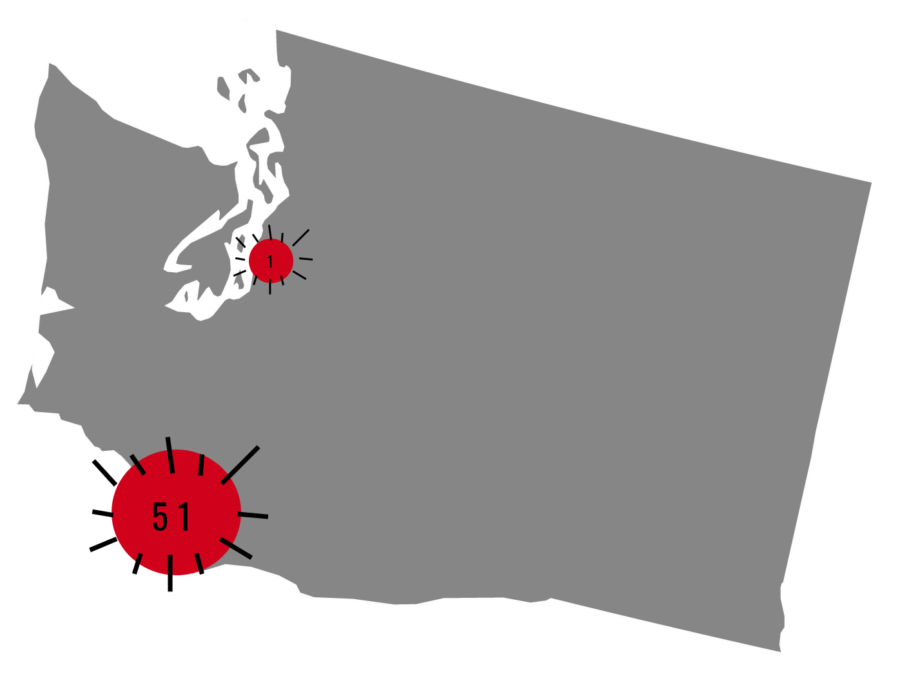Nurse Paula Coumou explains AWS response to measles outbreak
February 8, 2019
Governor Jay Inslee declared a state of emergency on January 25, in response to the over two dozen confirmed cases of the measles at the time.
According to Jay Inslee’s Communications Office, “The proclamation directs state agencies and departments to utilize state resources and do everything reasonably possible to assist affected areas. A proclamation is also necessary to utilize the Emergency Management Assistance Compact to request additional medical resources from other states.”
Inkwell talked with school nurse Paula Comou about the measles outbreak in Washington and Annie Wright’s response.
Inwell: What is the measles?
PC: It is a virus. It starts with a fever and a runny nose, and it can almost mimic a cold for a little bit and then a few days later, you start to get the rash. The rash is usually how the doctor diagnoses it. And it can often last a week or more.
Inkwell: How severe is the measles?
PC: The thing to watch for is the complications that can occur afterwards, especially in the ears and the brain. It can be serious, especially for pregnant women, because it crosses the placental barrier into the baby, even if the mother is immune. A mother’s immunity can help, but it is still fairly dangerous for pregnant people. Because it can cause secondary infections such as encephalitis, which is inflammation of the brain, it can cause death that way. It is those secondary complications that can cause death. From the Washington State Department of Health, it says it is rare that the measles causes very serious complications like encephalitis, seizures, brain damage and death. When you have measles, it causes a really, really high temperature that is sometimes very hard to bring down especially in little children. That is what can cause the seizures.
Inkwell: What is Annie Wright’s response to the outbreak?
PC: We have done a couple of things. The Health Department plays a role in what the school does too. The Health Department sent us a letter saying that we have to notify anyone in the community that is not vaccinated against measles that an outbreak has occurred in Washington State; however, we notified everybody. Another thing we do is keep an eye out for those who are not vaccinated, so I have a list of people who, for either medical, personal or religious reasons, are not vaccinated against measles. I always have that list ready to go. Also, those that have not given me their immunization forms, so I have that list too. I also have a list of those, that I know of, that have a condition that is called immunosuppressed, like a diabetic for example. Their immune system is not as strong as everybody else’s. They may have been vaccinated, but sometimes their immune system can’t fight these things. Anyone on steroid therapy is immunosuppressed because that is what steroids do, and anyone with mono is really susceptible to it as well. There are certain health conditions that I have to look out for. Pregnant women too, there are some teachers around school that are pregnant. I keep an eye on all these things. I try to keep it all up to date, so I know if we do get someone who has measles that I know who I need to notify and who needs to leave school. We try to educate, too. I do have, since the measles outbreak, people that have contacted us and said “we aren’t quite up to date yet” and they are going ahead and getting their vaccinations.
Inkwell: What is Annie Wright’s policy on vaccinations?
PC: Our policy is, you can be exempt of vaccines as long as I have a certificate of exemption on file from your doctor. Anybody who is exempt from vaccines for whatever reason has to be counseled by their doctor, and that is a state law, not a school law. That is our policy, really. We don’t enforce anything. We can’t enforce that you are vaccinated as long as you have the right documentation; we can only encourage. The state law doesn’t tell us that kids have to be vaccinated; they tell us that if they’re not vaccinated then they have to have the form on file from the doctor that says why and what vaccines they are not vaccinated against.
Inkwell: What causes an outbreak? Why here?
PC: I kind of agree with what the state says, that its from those that have not been vaccinated. The disease is rearing its head and starting to spread between people again. I think Vashon Island especially, as a lot of their kids are not vaccinated, not to point them out. I was talking to a school nurse from Vashon at a school nurse conference back at the beginning of the school year, and she was saying that they are world renowned for not vaccinating children there. She said everybody knows about us. No matter how much she pushes vaccinations, there is not much she can do because the state law says that they are allowed an exemption. Some states don’t; some states only allow a medical exemption. Here we still have all three: medical, personal or religious. So even if you didn’t agree with it, you could just put personal exemption, but you still have to be counseled by the doctor. We don’t have that herd immunity that we were used to having, and things are rearing their heads, like the measles and pertussis (whooping cough) three or four years ago. There was always that talk. I think it was a British doctor and he caused a scare that the MMR vaccine caused autism in children, and he was lying about it. He was even found to be lying about it, but it scared everybody, so people started to back off, and I think that has been a part of it. It is unproven, but the amount of people that believe it! There is no evidence out there that it does cause anything like that.










